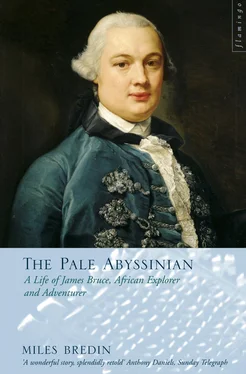They continued along the coast to Tripoli through territory that was disputed between the Basha of Tripoli and the Bey of Tunis. It was Bruce’s first taste of real desert travel and the journey, full of incident, was good training for the years ahead. In Tripoli they were met by one of Bruce’s myriad distant cousins:
The Hon. Mr Frazer of Lovat [After the débâcle of the suicidal consul at Algiers Archibald Campbell Fraser would eventually succeed Bruce.], his Majesty’s consul in that station, from whom I received every sort of kindness, comfort and assistance, which I very much needed after so rude a journey, made with such diligence that two of my horses died some days after.
Interestingly, whilst Bruce writes only about the death of two horses in his book, in a letter to Robert Wood he claimed that on the ‘night of the third day we were attacked by a number of horsemen, and four of our men killed upon the spot’. The version in the book is probably closer to the truth for in the letter (which he knew was not only for Wood’s eyes) he wanted to show what hardships he had suffered whilst painting the king’s pictures. He was no longer travelling on official business, of course, but he wanted the king and others to know that he had suffered for his art. Either way, the journey had been hard but also productive. They were not yet in uncharted territory but this was country where travellers had to look after themselves, thriving or withering according to their talents rather than their riches. On the expedition, Bruce learnt the rudiments of command, the dangers of travelling when the sun was high and had the need to be sufficiently prepared reinforced. They had encountered trouble because of Bruce’s impatience in not waiting for a letter of introduction to a tribal chief. He would not make the same mistake again.
From Tripoli, Bruce had to return by boat to Tunis where he stayed with the British representative, Consul Charles Gordon, another distant cousin. He doubtless saw his good friend Maria – an Italian in Tunis – about whom we know little but who continued to write her carissimo love letters for years afterwards. This was a convenient relationship for Bruce since Maria wrote that she had a jealous father and that Bruce should therefore never reply to her letters. He received the correct introductions to the Basha of Tripoli before setting off once more in August 1766 for Tripoli and Benghazi. Before doing so, however, he made sure that his paintings and notes from the first part of his journey were sent to Smyrna (Izmir) in the care of an English servant. He was now embarked on strenuous travels and did not want the extra burden of the hundreds of pictures he had completed. The future Libya was in a pitiable state: internecine warfare and famine made it a much more formidable destination than Tunis and Algiers. In Benghazi ‘ten or twelve people were found dead every night in the streets, and life was said in many to be supported by food that human nature shudders at the thought of’.
The general lawlessness exacerbated by famine meant that travel was not easy and Bruce only managed to see the principal sites of ancient Pentapolis, the ruin-bedecked area around Tolmeita and Benghazi that borders the Mediterranean. They too were recorded and written about with his usual fierce debunking of myth and legend. Soon, however, it became too hard to travel for so little reward – the ruins were more ruined even than those he had visited hitherto – and so in November they ‘embarked on board a Greek vessel, very ill accoutred’ for nearby Crete. It soon emerged that it was the captain’s first voyage and that he had no idea what he was doing. Within a few hours they were wrecked. Bruce described the mishap in his Travels: ‘We were not far from shore, but there was an exceeding great swell at sea.’ They tried to reach safety in a tender but that was soon swamped so Bruce threw himself into the sea crying, ‘We are all lost; if you can swim, follow me.’
‘A good, strong and practised swimmer’, he soon reached the surf but that was only the beginning of his problems; there was a riptide and he was beaten about by the waves for a good few minutes before he finally trod ground.
At last, finding my hands and knees upon the sand, I fixed my nails into it, and obstinately resisted being carried back at all, crawling a few feet when the sea had retired. I had perfectly lost my recollection and understanding, and after creeping so far as to be out of the reach of the sea, I suppose I fainted, for from that time I was totally insensible of any thing that passed around me.
Having prevailed against the sea and storm, he now had to prevail against the inhabitants who, like their Cornish contemporaries, saw a good shipwreck as manna from heaven, particularly when the victims were Turks as they suspected Bruce and his bedraggled, but miraculously alive, servants to be. Roasting in the hot sun, the semi-conscious Bruce had been stripped and bastinadoed before it occurred to him that he could speak his captors’ language – Arabic. As soon as he explained that he was a Christian doctor he was given succour by the local sheikh. It was, however, a sick and disconsolate Bruce who arrived back in Benghazi two days later. He was lucky that he had sent his earlier paintings on to Smyrna but even then it looked like his travels would be finished before he had even started. Much of his most essential equipment had been lost in the wreck.
I there lost a sextant, a parallactic instrument, a time-piece, a reflecting telescope [for astronomy], an achromatic one [for terrestrial observation], with many drawings, a copy of M. de la Caille’s ephemerides down to the year 1775, much to be regretted, as being full of manuscript marginal notes; a small camera obscura, some guns, pistols, a blunderbuss, and several other articles.
Without all these instruments Bruce would become the kind of traveller that he despised. He needed the equipment to legitimize his wanderings and give a purpose to his travels. In the age of Enlightenment it was no longer thought desirable to discover places unless they could be given co-ordinates and drawn on a map.
Disgruntled and frustrated, Bruce arrived in Syria a few months later. His brush with death on the Barbary coast in 1766 was still bothering him the next year: he had done himself more harm than he had initially realized and the weak chest of his childhood was beginning to affect his life again. When he had eventually arrived in Crete on a more reliable vessel, he had been confined to his bed for months. Malaria, near drowning and the terrible buffeting he had received in the African surf were all conspiring to undermine his physical health. His mental state was none too good either. In the past few years he had failed as a diplomat and foundered as an explorer; if things did not look up soon he would have to steal back to England and marry Margaret Murray, then a child, now a mature woman, whom he had left behind with a miniature of himself for solace. He knew that Margaret was still waiting for him since he received the occasional letter from his friends in Rome giving him independent information about the lovesick girl. ‘I shall only add that little Murray and all your friends here remember you most affectionately,’ he had been told in a recent letter from Robert Strange.
In between bouts of ill health, he made the occasional trip with Balugani to see the sights of Syria, Cyprus and Turkey though most of the time he was seeing places already well-documented by others. This was, after all, Latin Syria where crusaders, pilgrims and latter-day knights had been living for centuries. His expeditions could do little other than satisfy his own curiosity and add more pictures to his already bulging portfolio. None of this adventuring was really worthwhile without the appropriate scientific instruments and they were very hard to come by. He had written to all his friends in France and England but they all encountered the same difficulty: ‘Everybody was employed in making instruments for Danish, Swedish, and other foreign astronomers; that all those which were completed had been bought up, and without waiting a considerable and indefinite time, nothing could be had that could be depended upon.’
Читать дальше











